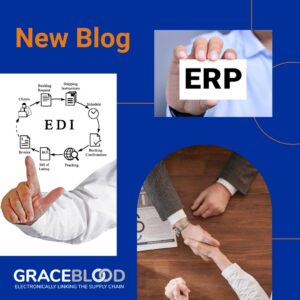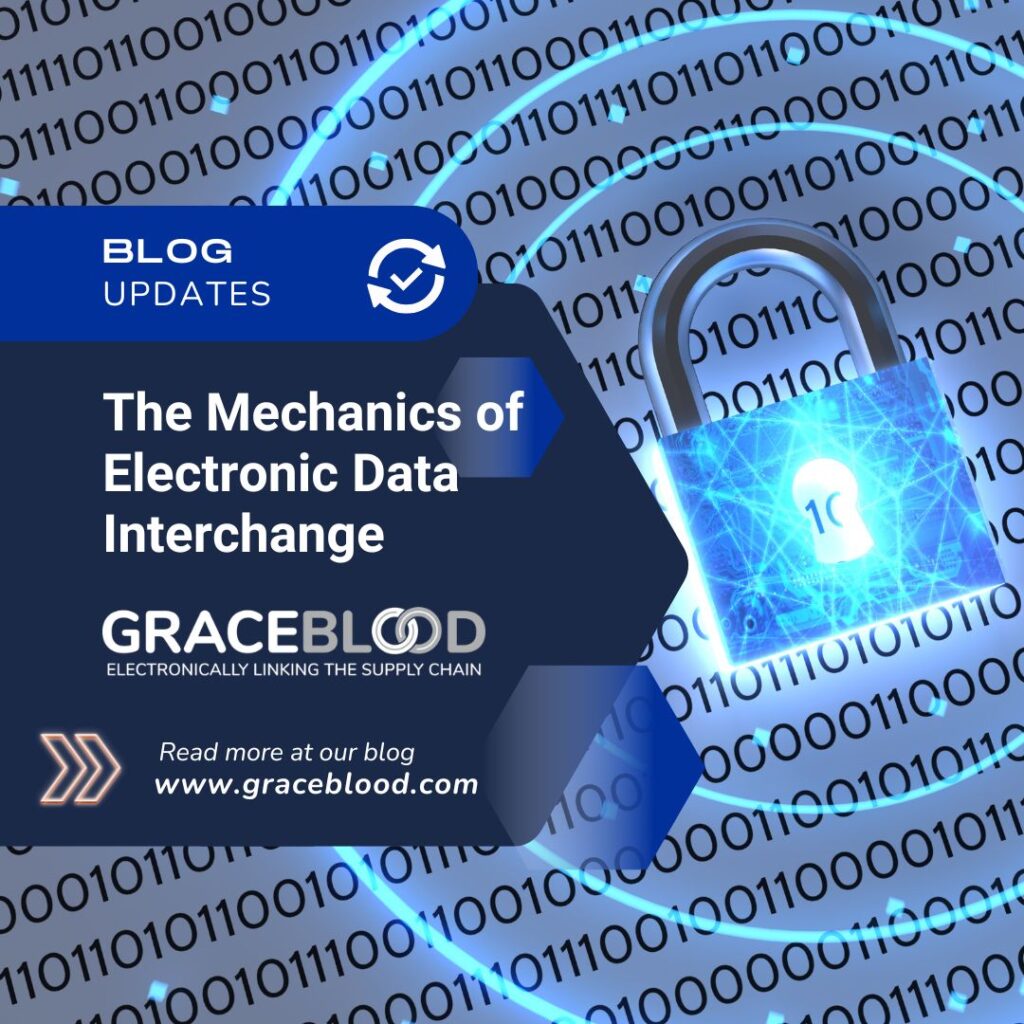 Updated 1/27/25
Updated 1/27/25
Enterprise Resource Planning (ERP) and Electronic Data Interchange (EDI) systems play a crucial role in modern business operations. ERP systems help manage core business functions, while EDI automates the exchange of business documents with trading partners. Integrating these two systems enhances operational efficiency, reduces manual errors, and ensures seamless data flow.
GraceBlood, an EDI provider specializing in EDI integration solutions, provides tailored ERP and EDI integration services that help businesses streamline operations, improve compliance, and optimize supply chain visibility.
Table of Contents
- What is an ERP System?
- What is EDI?
- ERP and EDI Together: Why Consider Integration?
- The Role of Cloud Technology in ERP and EDI Integration
- How GraceBlood Supports ERP and EDI Integration
What is an ERP System?
An Enterprise Resource Planning (ERP) system is a software suite that consolidates various business functions, including finance, supply chain management, human resources, and customer relations, into a unified platform.
Common ERP platforms include:
- Acumatica: A widely used cloud-based l ERP solution.
- NetSuite: Provides comprehensive enterprise applications.
- Dynamics 365: A flexible ERP system for businesses of all sizes.
What is EDI?
Electronic Data Interchange (EDI) is the structured transmission of business documents such as invoices, purchase orders, and shipping notices between organizations in a standardized electronic format.
EDI plays a key role in:
- Automating transactions between trading partners.
- Reducing paperwork and manual data entry.
- Improving transaction accuracy and efficiency.
ERP and EDI Together: Why Consider Integration?
Integrating ERP and EDI enhances business operations by providing real-time visibility, reducing errors, and improving compliance.
Below are the key benefits of ERP-EDI integration:
1. Real-Time Inventory Data
Having accurate, up-to-date inventory data is essential for efficient operations. Integration ensures that product availability is updated in real time, helping businesses manage stock levels effectively and reduce the risk of overstocking or stockouts. Cloud EDI-ERP integration decreases data discrepancies and streamlines item setup and maintenance, reducing the risk of errors, optimizing inventory levels, reducing excess stock costs, and strengthening supplier relations. Thanks to these factors, you’re able to respond more quickly to changing market conditions and enjoy better negotiation terms with suppliers, leading to cost savings and a sharper competitive edge.
2. Enhanced Visibility into Shipping and Tracking Details
ERP-EDI integration provides real-time tracking of orders, inventory, and shipping status. This visibility enables businesses to meet customer expectations, reduce delays, and optimize logistics operations. Integrating cloud EDI with ERP systems streamlines shipping and tracking processes through automation and real-time tracking, significantly reducing the need for manual tracking and follow-ups and significantly improving accuracy. As a result, you’ll significantly lower operational costs while improving customer service, retention, and satisfaction—all leading to improvements in profitability and revenue.
3. Reduction in Manual Errors
Manual data entry is prone to human errors, leading to discrepancies in transactions. Automation through ERP-EDI integration minimizes human intervention, reducing costly mistakes and improving data accuracy. By eliminating redundant data entry, businesses can significantly cut down processing times and enhance productivity. Integrated systems help standardize data formats, ensuring consistency across different transactions and reducing misinterpretations. Additionally, automation enhances data validation processes, flagging inconsistencies before they become costly issues. This not only improves internal operations but also enhances relationships with trading partners by ensuring accurate and timely document exchanges. Over time, reducing manual errors leads to better decision-making, fewer chargebacks, and enhanced overall operational efficiency.
4. Improved Compliance and Reporting
Many industries require businesses to meet specific compliance and reporting standards. An integrated system ensures seamless compliance with industry regulations, enhances audit readiness, and improves data consistency. When you integrate cloud EDI with ERP, you unlock enhanced tracking and management of your assets, enable more efficient and proactive maintenance scheduling through real-time data, and enable quicker decision-making. With these capabilities, you’ll enjoy optimized asset utilization, reduced maintenance costs, and improved operational efficiency that minimizes downtime and maximizes property—all of which maximizes return on investments.
The Role of Cloud Technology in ERP and EDI Integration
Cloud technology has revolutionized ERP and EDI integration, offering scalable and cost-effective solutions. Businesses now have the flexibility to choose between cloud-based or on-premises integration, depending on their needs.
Benefits of Cloud-Based Integration
- Scalability: Easily expand capabilities as business grows.
- Flexibility: Adapt to changing business requirements with minimal disruptions.
- Cost-Efficiency: Reduces the need for extensive IT infrastructure.
- Enhanced Accessibility: Remote teams can access data anytime, anywhere.
On-Premises vs. Cloud Integration
While on-premises integration offers more control over data and security, cloud integration provides agility and reduces maintenance costs. Businesses must weigh the pros and cons based on their operational needs.
How GraceBlood Supports ERP and EDI Integration
GraceBlood offers customized ERP EDI integration solutions, including real-time API driven data exchange, ensuring seamless operations and enhanced business performance.
Tailored Solutions for Your Business Needs
GraceBlood designs custom integration strategies based on your specific business rules, ensuring smooth and efficient transactions. By taking a personalized approach, we assess the unique challenges and requirements of each business, ensuring that the ERP-EDI integration aligns with operational workflows. Our team works closely with clients to configure solutions that optimize data flow, enhance transaction speed, and reduce inefficiencies. Additionally, GraceBlood ensures that integrations are scalable, allowing businesses to adapt to growth and evolving market demands. Whether a company needs to onboard new trading partners, manage diverse transaction formats, or navigate industry-specific compliance requirements, GraceBlood’s tailored approach ensures a seamless and future-ready integration.
Reliable Support and Monitoring
Continuous oversight and proactive monitoring ensure optimal system performance, minimizing downtime and maximizing productivity. GraceBlood provides real-time monitoring tools that help businesses detect and resolve issues before they escalate. Our dedicated support team is available to address technical challenges, perform system health checks, and ensure data integrity. In addition to 24/7 monitoring, we offer performance analytics that provide valuable insights into transaction trends, helping businesses identify potential bottlenecks and inefficiencies. Regular updates and maintenance ensure that integrations remain optimized and in sync with the latest industry standards. By leveraging our proactive approach, businesses can avoid disruptions and maintain seamless operations with confidence.
Proven Track Record of Success
GraceBlood has successfully implemented ERP-EDI integrations for companies like Santa Monica Seafood and Retractable Technologies:
- Santa Monica Seafood leveraged GraceBlood’s VelociLink™ to enhance ERP migration, improving visibility and operational efficiency. The complexity of their industry, coupled with the challenge of onboarding more than 40 trading partners, made integration a necessity. By implementing GraceBlood’s fully managed EDI solution, Santa Monica Seafood was able to streamline their invoicing process, ensure seamless data synchronization, and reduce IT workload, enabling their team to focus on strategic growth initiatives
- Retractable Technologies streamlined their EDI operations using VelociLink™ Cloud EDI, enabling better tracking and self-sufficiency. Prior to integration, Retractable faced inefficiencies with tracking down missing addresses in EDI documents, which created workflow disruptions. With GraceBlood’s solution, they gained real-time visibility into their orders, improved transaction accuracy, and fostered a self-service culture that reduced dependency on external support. Their order management team now saves hours daily by leveraging automation and intuitive search capabilities
What’s the Bottom Line?
Seamlessly integrating ERP and EDI systems is no longer a luxury but a necessity for businesses looking to improve efficiency, reduce errors, and maintain compliance in an increasingly digital landscape. Companies that adopt these integrated solutions can expect enhanced operational visibility, streamlined workflows, and improved business agility.
By choosing GraceBlood as your integration partner, you gain access to industry-leading expertise, robust technology, and customized solutions tailored to your specific needs. Our proven track record, proactive support, and commitment to innovation ensure that your business remains competitive and prepared for future growth. Whether you are undergoing an ERP migration, expanding trading partner networks, or optimizing supply chain operations, GraceBlood provides the tools and expertise necessary for long-term success.
With the right ERP-EDI integration strategy, businesses can drive productivity, increase accuracy, and set the foundation for scalable, future-ready operations. Speak to one of our experts about our ERP partnerships or EDI implementation solutions.








